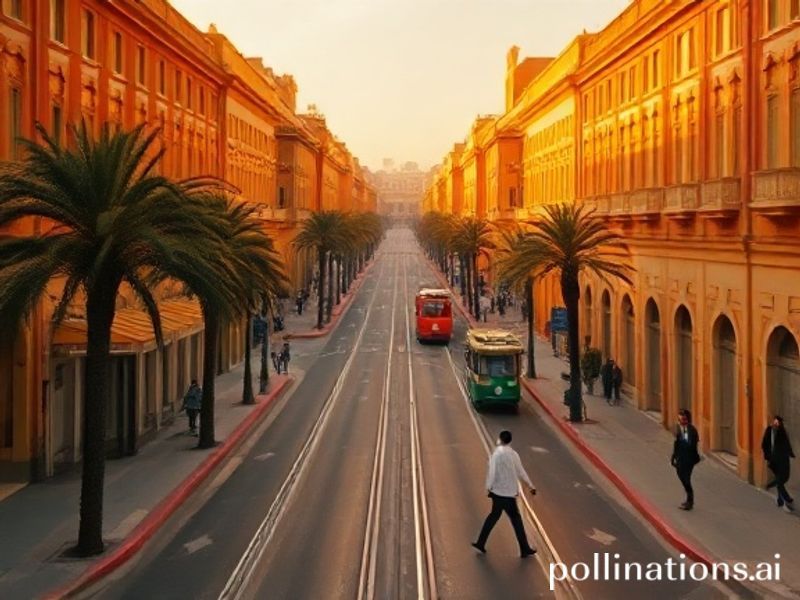Tunis: Where Empires Go to Renew Their Subscriptions
Tunis—population 2.7 million, median age 32, SPF factor “wishful thinking”—sits on the Mediterranean like a cynical postcard: azure sea on one side, sub-Saharan migration routes on the other, and a constitution that’s been rewritten so often it qualifies as performance art. To the wider world, Tunisia’s capital is either the place where the Arab Spring did its first keg-stand in 2011, or a bargain-basement cruise stop between Sicily and Libya’s oil-smudge horizon. Both reputations are true, which is precisely why the city keeps diplomats awake at night and budget airlines in business.
Start with the obvious: Tunis is the only capital whose main boulevard still honors Mohamed Bouazizi, the fruit-seller whose self-immolation kicked off a regional fire-sale on dictators. Eleven years later, the planet’s foreign-policy elite fly in, sip thimble-sized espressos at the Café de Paris, and ask whether democracy can be refunded after the receipt fades. Washington ships military radios, Brussels forwards PowerPoints on judicial reform, and Beijing quietly builds the 5G towers that will broadcast whatever comes next—preferably in 8K and under budget.
Zoom out and you’ll see why the city matters beyond hashtag nostalgia. Tunis is the chokepoint where Europe tries to outsource its conscience: pay North African coast guards to intercept migrants, then act surprised when human-rights reports read like dystopian fan-fiction. Italy’s new government treats Tunis as an offshore waiting room; the EU pays in euros, smugglers pay in dinars, and everyone agrees the exchange rate is a riot—sometimes literally. Last month a record 3,200 people left the port of Sfax in one weekend, the maritime equivalent of Black Friday if the discounts were on life expectancy.
Meanwhile, the International Monetary Fund dangles a $1.9-billion bailout the way one dangles car keys over a hungover friend: sure, you can drive, but first promise to stop drunk-spending on subsidies. Tunisian policymakers respond by raising the retirement age, which is bold in a country where youth unemployment already doubles the global average. The dark joke making rounds at the Bourse de Tunis: “We’re not losing jobs; we’re gaining retirees who can’t afford to stop working.”
The broader punchline is geopolitical. Russia’s war on Ukraine has rerouted grain ships southward, turning Tunis into an accidental breadbasket for Levantine bakeries. Ukrainian wheat, Russian fertilizer, Turkish mediation—everyone’s pantry converges on a harbor that can’t always keep the lights on. Global food inflation now charts inversely to Tunisian patience, a correlation so reliable hedge funds are probably shorting olive oil futures as we speak.
Climate change, never shy of a cameo, is salting the fields of Cap Bon, the country’s agricultural promenade. Rising seawater doesn’t respect colonial-era property deeds; it merely globalizes them. European insurers quote premiums that read like ransom notes, while local farmers invent new gods and drip-irrigation schemes in equal measure. If the Sahara were a start-up, Tunis would be its Series A funding round—complete with sandstorms that reach Stockholm and solar panels the Chinese install faster than you can say “green transition.”
Still, the city refuses to collapse on cue. Nightlife on Rue de Marseille pulses with French rap, Libyan techno, and Sahel afro-beat—proof that humans can dance even while their central bank burns through foreign reserves like a tourist on last-call rum. Universities churn out engineers who speak four languages and code in a fifth, then emigrate to Montreal the moment they can spell “ Schengen.” Diaspora remittances arrive monthly, Tunisia’s truest form of constitutional checks and balances: if the government misbehaves, the cousins in Paris simply withhold Christmas cash.
What does Tunis tell the planet, then? That revolutions are like cheap umbrellas: inspirational when opened, useless in a hurricane. That democracy is less a binary switch than a dimmer controlled by creditors. And that geography still trumps ideology—every wave that slaps the seawall at La Goulette carries Europe’s Amazon packages, African aspirations, and the occasional body bag in a 40-foot container.
So book the discounted airfare, dear reader. Wander the Medina, Instagram the Ottoman doors, and tip the guide who explains how every empire—Roman, Arab, French, algorithmic—eventually files for overtime. Just remember: in Tunis the sunsets are free, but the rest of the future is subject to interest rates, migration policy, and the small print no one reads until the boats are already burning offshore. Bon voyage, and may your currency be stronger than your illusions.







